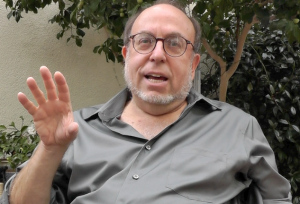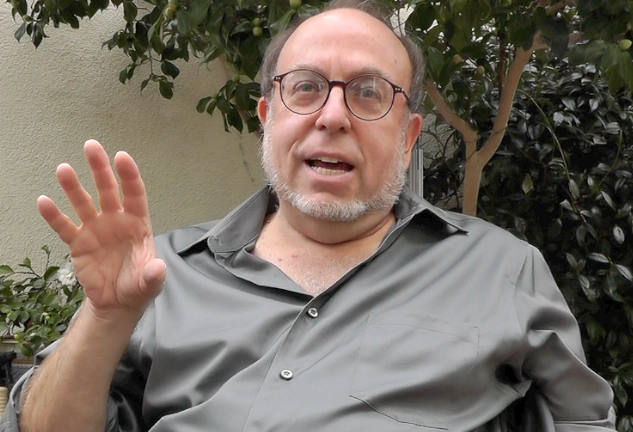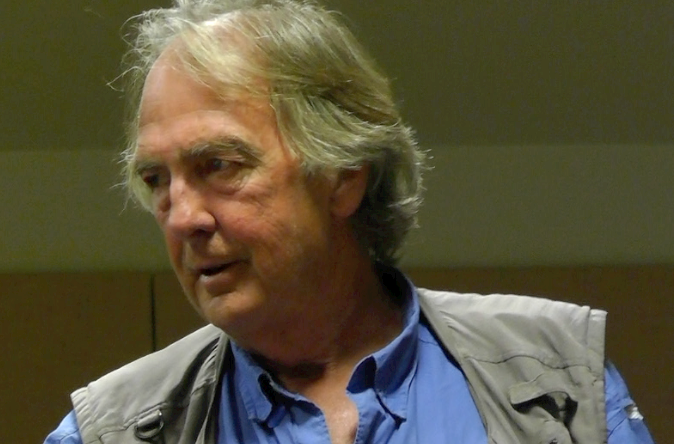
Journalist Harold Meyerson on declining wages in the United States: "The de-unionization of the American workforce is absolutely a crucial factor." Paul Laverack / El Nuevo Sol.
EL NUEVO SOL
Harold Meyerson is editor-at-large of The American Prospect, a monthly liberal magazine based in Washington, DC. He is also a weekly columnist for The Washington Post, writes on an occasional basis for The Los Angeles Times, and was a longtime contributor to LA Weekly.
On November 24, 2011, Meyerson sits for an extended interview, in which he weaves together several narrative strands, involving the recent history of Los Angeles and the rise of Latinos as a demographic and political force, the decline of labor unions nationwide and the shoddy coverage they receive in the corporate press, as well as his observations on corporate power and the shrinking of the American middle class. Meyerson also weighs in on the lessons which can be drawn from the career – and coverage – of Steve Jobs. Several segments of the conversation can be seen below, in a series of video excerpts.
In the first video, Meyerson describes the demographic shift in Los Angeles during the 1980s and 1990s, as Latino immigrants changed the face of the city. Meyerson credits Miguel Contreras as having the vision to mobilize this population politically. Meyerson also contrasts the differing strengths of the Latino populations in California and Texas.
In the video below, Meyerson traces the decline of labor coverage in the corporate press, using the wide press reports of the death of 1940s labor leader Sidney Hillman as a point of departure.
Meyerson also observes how the rise of labor history as an academic discipline has matched the disappearance of labor journalism. Meyerson points out that the decline of labor journalism has allowed misinformation about workers to gain wider play, and go uncontested.
The hard questions about the future of manufacturing and the decline in wages go largely unexamined, Meyerson asserts, except in the Left press, which he points out does not have an especially broad reach.
In the following video, Meyerson links the decline of wages to the decline of unions, and points out the historical importance of unions in protecting the living standards even of workers who don’t belong to unions. This relationship has been upset by globalization, and Meyerson points out that in America the shift in class power has been greater than in Europe.
Next, Meyerson touches briefly on how the destruction of private sector unions has been used to generate a backlash against the remaining public sector unions, whose pay and benefits are supplied by taxpayers – citizens who have seen their own salaries and benefits slashed in recent decades.
Below, Meyerson discusses Walter Isaacson’s biography of Steve Jobs, using it as an example of the long-term disappearance of labor from media portrayals of American life. Meyerson observes that in this enormous, richly detailed biography, the 750,000 Chinese workers who assemble Apple’s products are virtually invisible. Neither is there any discussion in the book of how Apple came to shift its workforce overseas, and end its manufacturing concern in the United States.
In the video which follows, Meyerson draws a distinction between two titans of industry – Henry Ford, who paid his workers enough to buy the products they made, thereby contributing to the creation of the American middle class; and Steve Jobs, who was complicit in the outsourcing of hundreds of thousands of manufacturing jobs to China, thereby helping to destroy the American middle class.
Lastly, Meyerson talks about the failure of organized labor to achieve remedies through the degraded American political system. He notes that labor has embraced Occupy Wall Street, which is a break from historical precedent. Meyerson thinks this is a hopeful sign, and he goes on to say that “continuing forms of mass mobilization” will be necessary to rebuild the American middle class.
Tags: apple California corporate media filibuster harold meyerson henry ford hotelworkers immigration interview janitors labor Latinos Los Angeles mainstream press middle class miguel contreras occupy wall street offshoring outsourcing senate steve jobs texas unions walter isaacson workers




















